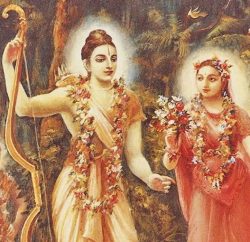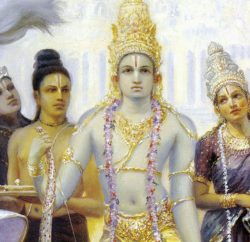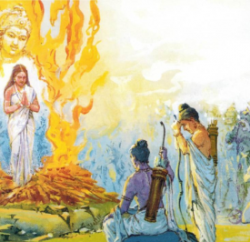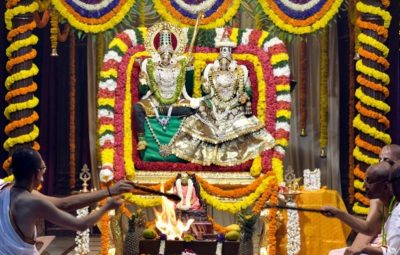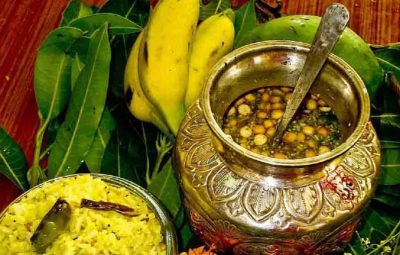Jaya Sri Ram! As we enter into the auspicious ten days of the Dasara, which will culminate in the Vijayadashami, the day of victory of Good, represented by Lord Rama over the Evil-Ravana; we bring you a series of narrations from Ramayana, describing ten transcendental qualities of Lord Ramachandra, one for every day of the Dussehra.
Please read and relish, like and share these articles, and you may also leave your comments to us.
Table of Contents
Quality 5: Lord Rāma, Ekapatni vratastha
One of the great qualities for which Lord Rāmachandra is famous is that he is an eka-patni vratastha or a ‘monogynist’ one who practices monogyny, the principle of having only one wife.
In Tretā yuga, an age where the men of royal order could possess many wives, Lord Rāma, being a Kshatriya and the most adored King, could easily have accepted multiple queens, which he never did. Rāma, the charming and handsome youth would easily steal the heart of any woman, who then strongly desired to have Him as her husband. But Lord Rāma, staunchly held to his vow of having only Sītādevi, as His one and only consort and rejected any lady that approached him with such desires.
Living in the Green, under the Blue
In the middle of the night, Lord Rāma arose and woke up His wife Sītā and Lakṣman. The trio left silently, with Sumantara, the charioteer, being scared of the fact that the city of Ayodhyā could be left deserted if the people noticed their departure. They proceeded into the dense forest, throwing their people out of the trail, then they let Sumantra off, after they entered the forest, and continued their journey deep towards the forest. 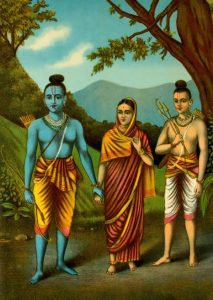
As they approached the forest, Lakṣman moved ahead and cleared the path with His sword, cutting through the thick creepers and bushes. Sītā enchanted by the beauty of nature, walked in the middle, with her head covered to protect Herself from the swarms of insects that flew around. Rāma brought up the rear, vigilantly watching on all sides and holding His bow at the ready.
After meeting many sages, the trio was on their way to see the famous sage Agastya. Rāma narrated various stories about Agastya. He had His brother and wife entertained as They walked throughout the day. On reaching the hermitage, Agastya offered his hospitality and later offered Rāma the celestial weapons he would need in the war against the Rākṣasas.
Rāma accepted the celestial weapons respectfully and then asked the sage to suggest Him a place where He could live. To which, the sage suggested them a nearby forest called Panchavati where all of their desires, would be fulfilled.
The curious case of Śūrpaṇakhā
Panchavati was beautiful and sanctified. The time passed quickly for the trio, as they say, good time fly rather quick. They happily lived in almost complete solitude, attended only by occasional ascetic.
One day, a powerful Rākṣasī Śūrpaṇakhā, reached Panchavati. Wandering around looking for food, she saw Rāma’s footprints and followed them. As soon as she arrived at the hermitage, she saw Rāma sitting outside His hut. She was immediately attracted to the handsome Rāma. His strong structure and majestic attendance filled Her mind with lust. She then assumed the form of a beautiful woman, in her fine silks and ornaments she resembled a celestial maiden and walked slowly before Him. She asked Rāma who were they, to which, Lord Rāma narrated his story.
On asking about her identity, she replied that her name was Śūrpaṇakhā, sister of the unconquerable Rāvaṇa. She lived with her brothers, Khara and Dushana and ranged these woods devouring ascetics and causing fear to all. She un-hesitantly expressed her feelings on seeing Rāma saying that she longed to embrace him as her husband. Śūrpaṇakhā hoped that even not attracted to her, out of fear Rāma might accede to her proposal. Hearing that she was a Rākṣasī, Rāma and Lakṣman looked at her in surprise.
She went closer to Rāma and smiled, throwing a disdainful glance at Sītā and asked of what use was the skinny and deformed woman. She advised Rāma to accept her as his wife. She continued that, after devouring his wife and his brother she will carry Rāma to the highest mountain where they can sport together in joy.
Lord Rāma laughed heartily. He decided to joke with the infatuated Rākṣasī. He replied saying that he was a monogynist and already married. But his younger brother very handsome and highly qualified was yet unmarried. So she should instead try Him as her worthy husband.
Śūrpaṇakhā turned quickly towards Lakṣman, who stood smiling with His hand resting on His bow. She asked him to look, at her alluring form, she was certainly worthy of becoming his wife.
Lakṣman could understand Rāma’s funny mood. He proposed her with a chuckle saying, only if she wished to become a servant. Since Lakṣman was dependent on his older brother, as his wife, she would be Sītā’s servant.
Śūrpaṇakhā dumb enough to catch the joke turned again towards Rāma, who sat next to Sītā. She asked Rāma impatiently if Sītā was the one standing between them, then she would devour her and they, could be together at ease.
Śūrpaṇakhā rushed furiously towards Sītā. She assumed her natural form of Rākṣasī, appearing like a black cloud. Rāma immediately roared and halted her by the sound alone. Realizing the threat, Rāma asked Lakṣman, to get rid of her, but to not slay since she was a woman. 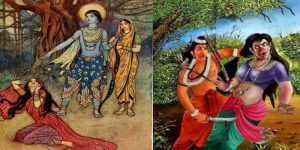
Lakṣman drew His sword and sliced off the Rākṣasī’s long nose and pointed ears. Śūrpaṇakhā screamed in pain. She realized the brothers were formidable and quickly ran off into the woods. Her dissonant and horrible cries could be heard disappearing into the distance as she retreated. The Rākṣasī then sought her brother Khara, who was the leader of the Rākṣasas in the forest. Going before him drenched in blood and crying loudly, she dropped upon the ground like a bolt from the blue. Khara sat surrounded by numerous powerful Rākṣasas, holding a massive club. When he saw his sister’s state, he frowned.
To seek revenge, Khara first sent fourteen powerful Rākṣasas, who were easily killed by Rāma. Angry Khara in utter disbelief marched towards Rāma with his army of evil. The sound of beating drums and roaring of Rākṣasas filled the air. Rāma realizing the omen, instantly ordered Lakṣman to take Sītā to some safe cave on the mountain. Khara, along with his army of fourteen thousand Rākṣasas were all killed by the invincible Rāma, in less than two hours.
The gods applauded Lord Rāma’s achievements. Sītā ran to Her wounded husband and embraced Him tightly. She ran Her hands over Rāma’s many wounds, and tears rolled down her cheeks. Rāma and Sītā then retired into Their hut, and Lakṣman sat nearby, keeping a lonely vigil.


